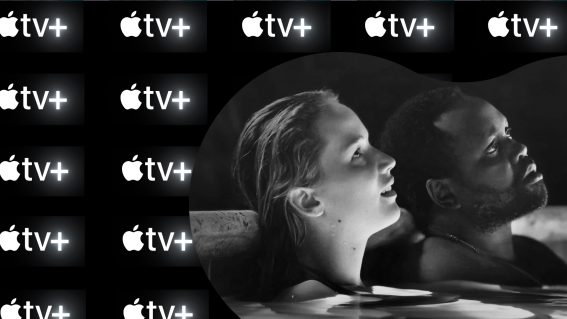Guy Montgomery chats about his new show, Guy Montgomery’s Guy Mont-Spelling Bee
Montgomery has convinced a network to make a competitive spelling TV show as funny as a word starting with F.
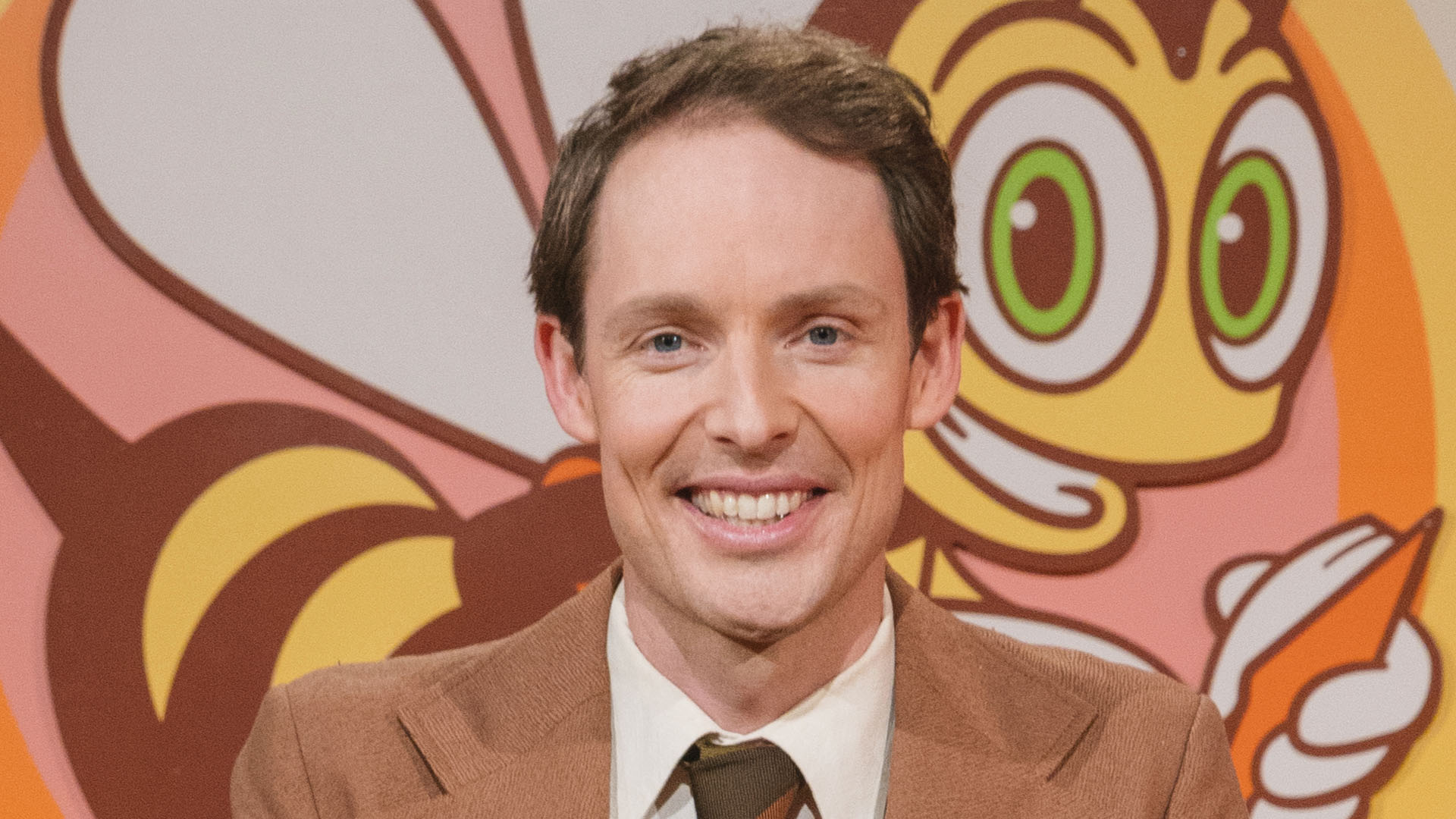
Guy Montgomery chats to Steve Newall about Guy Montgomery’s Guy Mont-Spelling Bee (which is a spelling bee).
Guy Montgomery's Guy Mont-Spelling Bee: Season 1
After entertaining us during lockdown with online spelling competitions, Guy Montgomery has successfully convinced Three to make a fully-fledged competitive spelling television show—a format that might be as likely as a bingo show on your New TV Shows In 2023 bingo card.
As host of Guy Montgomery’s Guy Mont-Spelling Bee, Montgomery and his droll persona put comedians’ spelling to the test with entertaining results as the likes of Tim Batt, Kura Forrester, Chris Parker and Angella Dravid squirm under spelling scrutiny.
The first episode sees Billy T nominee Abby Howells, Matt Heath, Hayley Sproull and Josh Thomson square off in a number of spelling-oriented rounds that range from the traditional to… the less so. Opening the show is the aptly named The Spelling Round (contestants choose their degree of difficulty—Coward’s Cup, Person’s Purse, or Bucket of Bravery), while elsewhere contestants are encouraged to improve on some unnecessarily complex words, to spell colours (not as simple as it might seem), or revisit past spelling errors from their own social media history.
In other words, a traditional format is being milked for all its mirth, especially when it comes to extracting litres of misery from its guests.
As Guy Montgomery’s Guy Mont-Spelling Bee arrives onscreen in Aotearoa, I spend a lot longer talking about a spelling TV show with Montgomery than I perhaps would have anticipated (then again, it’s a much more entertaining show than you might imagine).
This interview has been edited for length and clarity. And spelling.
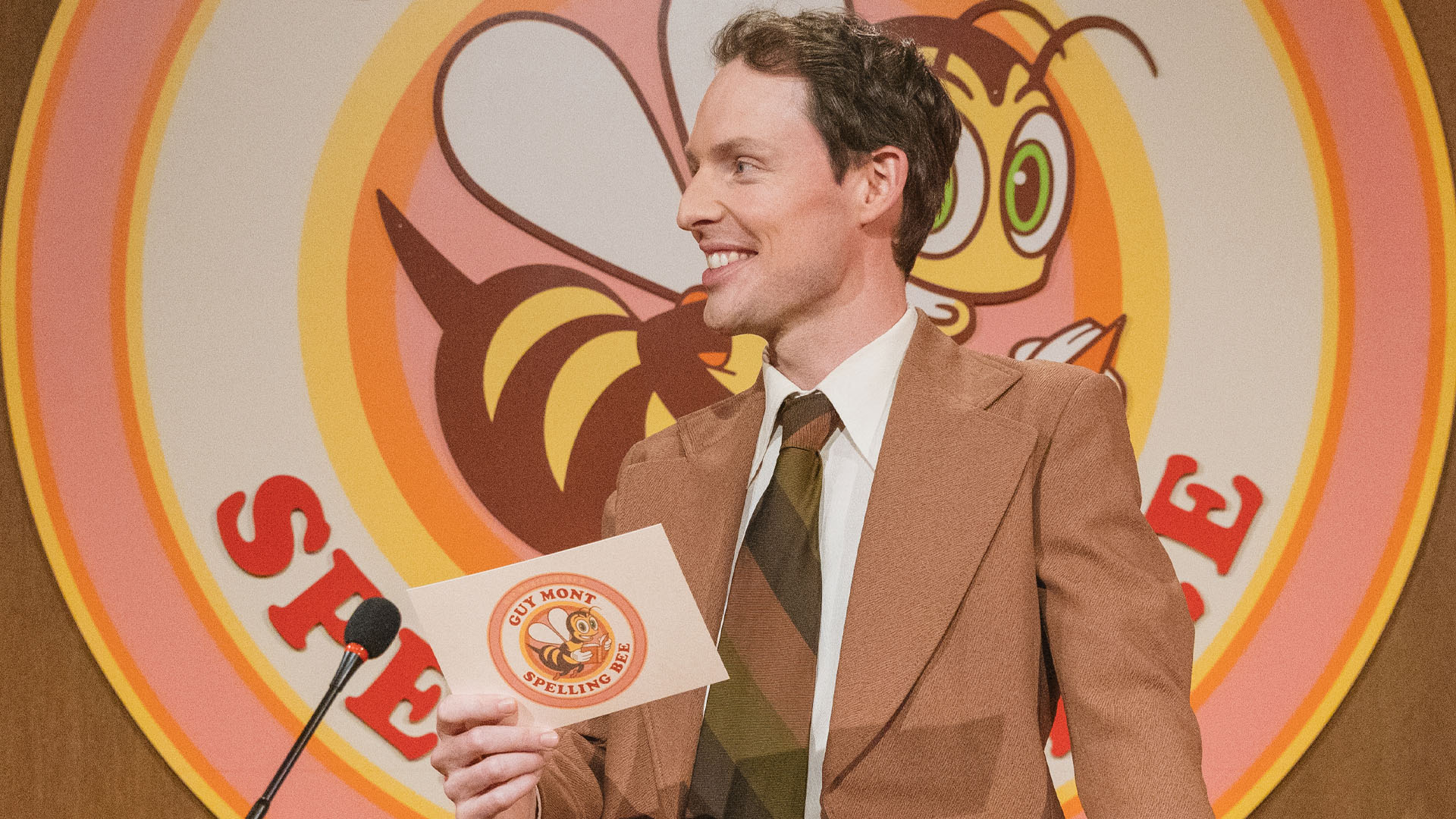
FLICKS: How proud were you when you came up with the name of the show?
GUY MONTGOMERY: I think it’s funny it got over the line with the network. It’s a very hokey title.
I’d have thought it would not stand up to any kind of professional scrutiny.
No, exactly. But I believe, in a sense, it’s important because it sets the tone for the experience. The main thing I listen to is Alan Partridge’s audiobooks and podcast From the Oasthouse and I think that some of his dickish persona has seeped through into the way I want to present myself, maybe—where it is so important to create a show and force your name into the title twice. It’s absurd.
To think of it is one thing, to do it online is another, but then to have a conversation with the network and say, it’s really, really important that this is the name of the show and have that actually wind up being the name of the show is just madness.
And who in their right mind would think that in 2023, a network would put a spelling competition on television?
Well, that is a very insightful and refreshing framing device you’ve introduced there. Because I don’t think if I walked in and said “we’re going to do a spelling comedy show” just off the bat, I would have had any nibbles. It is the somewhat proven track record that probably made it a slightly more alluring prospect. I was doing it on Zoom just to try and mentally navigate, create some sort of rewarding and creative output, have some fun and foster social connection during the recently-retired COVID-19 pandemic.
I’ve always had a strong kinship to spelling, I’ve always loved spelling, I’ve always believed myself to be good at spelling. And I thought it’s also great because everyone uses words and language and letters and everyone has to spell. And also, I liked it because it’s timeless. It’s a non-responsive show, it’s sort of pure escapism, and that it’s not attached to any of the comings and goings of the real world. I just thought “I’ll give this a try on Zoom”, then I did a handful on Zoom that were pretty well received.
Then, once we were allowed out of our house for a while, I tried to do a live show because it’s a pretty easily translatable format. And when that one worked well, I thought this could be a TV show. I paired up with [production company] Kevin and Co. and we in turn, teamed up with Three. And we went to the New Zealand taxpayer, or at least their delegates at NZ On Air, hat in hand and said, “Spelling in 2023—what do you reckon?”
Because that makes it effectively a Warner Brothers Discovery show, are there any issues with not using American spelling?
Not in New Zealand. I imagine it’s probably the one thing that is getting in the way of a lucrative distribution deal with some huge American network. But no, for better or worse, it’s all Anglicised spelling.
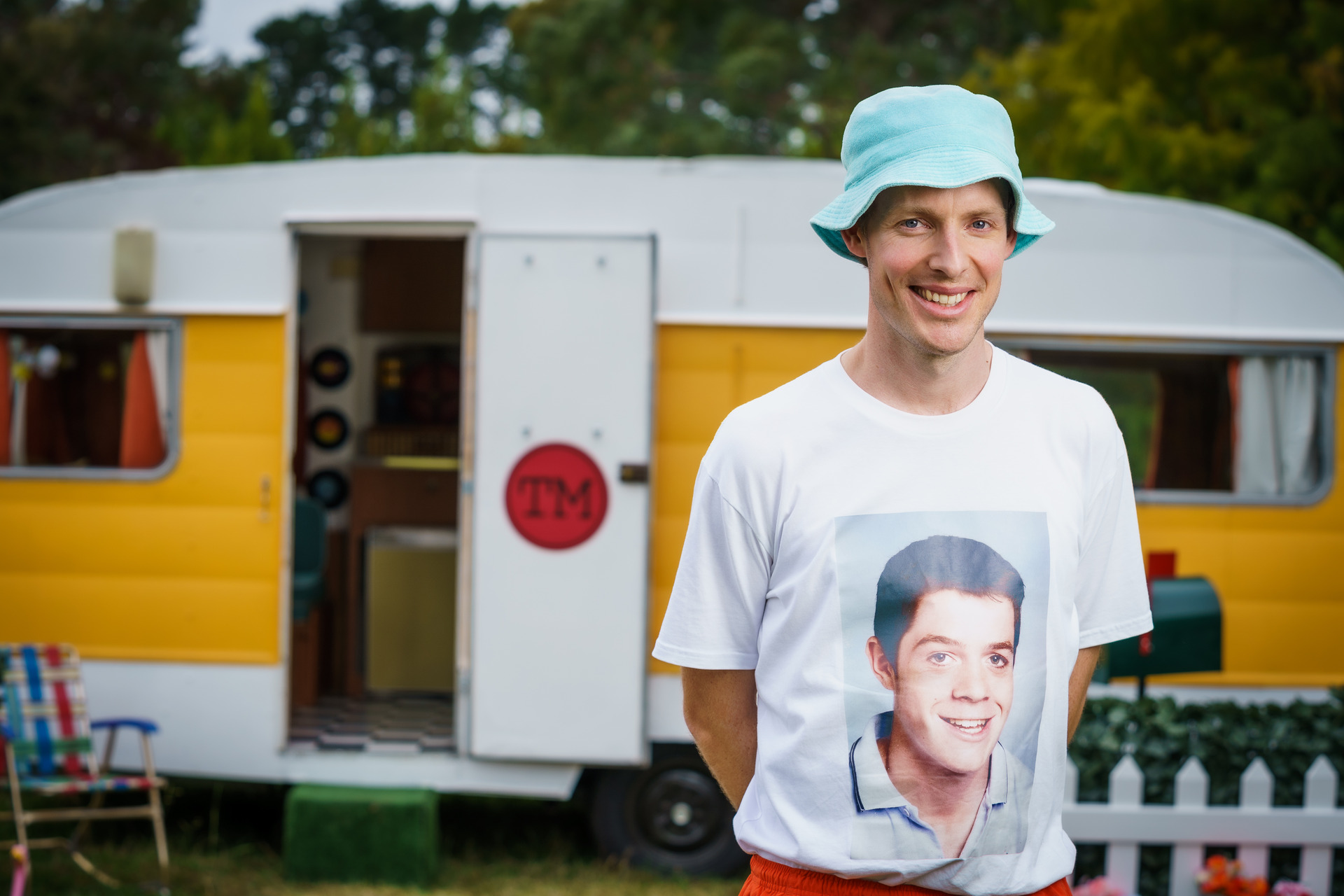
It seems in a similar ballpark to your experience on Taskmaster – putting comedians on the spot, with a very levelling task that the audience can compete on themselves.
I have total reverence and respect for Taskmaster. I was already a fan, but to experience the joy of competing inside of the format, I really felt like, as a comic, it brought out the best in me. I was responding to prompts that had been custom created to bring out some sort of response from me, whether that’s something, you know, humiliating or comedic or clever.
And so I tried to create another outlet for local New Zealand comedians to be put in that situation, in which the audience can play along at home. I’ve shown some friends moments from episodes where I think, you know, this is a great fun round that they’ll enjoy watching and, yes, they were engaged, but all these people were spelling over the jokes! I’m watching them to see if they laugh at something, and they’re asking me how you spell, you know, ‘miscellaneous’ or whatever.
In that respect, I’m really excited that it seems to be a show that you can play along to at home. And it’s also got a 7:30pm time slot. So it’s a show that can hopefully bring families, different friends and generations together in a unifying sort of experience.
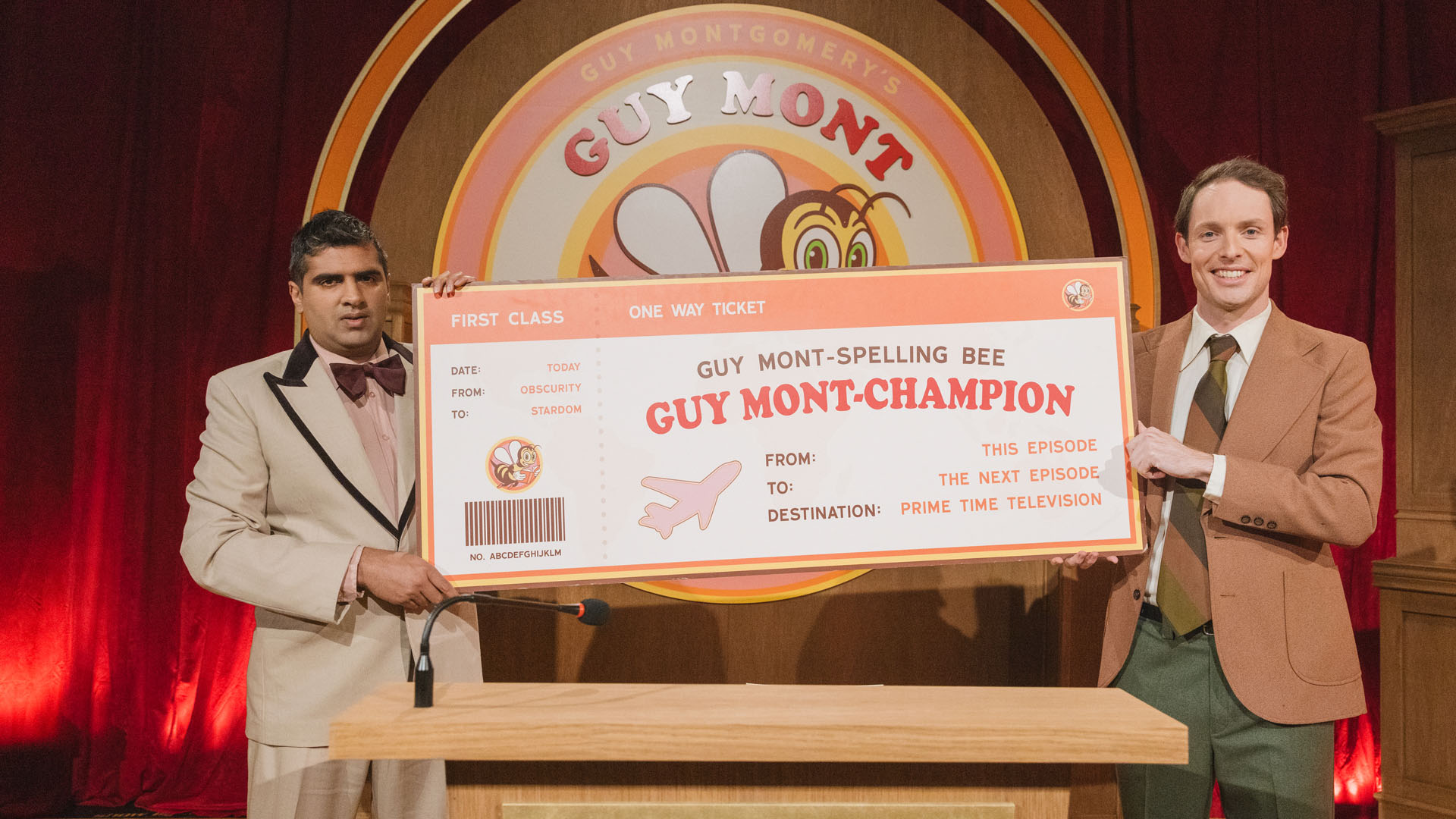
Where does Spelling Bee sit in the pantheon of studio game shows?
It’s almost caught halfway between a panel show and a game show, because ultimately, it has comedians competing for a prize that has genuine value. There are four comedians every episode, and if you win, you win a big novelty-sized one-way ticket to the next week’s episode. And the loser of each episode has to sit in the dunce’s corner, and wear the dunce’s hat, which I just think is very funny.
It’s this sort of absurd—I don’t even know if it was implemented in New Zealand—idea of an educational tool, built on the backbone of shame. I would also like to think this provides some sort of incentive to continue to try in the face of some spelling shortcomings.
The trailer suggests a bit of a retro look.
A big, big motivator and desire for me was for this show to feel timeless. A part of it that harkens back to an older style of television—it was very important to me that the set looks and feels like something quite tactile, a place that you’d want to physically touch and walk around, and all of the props were really thoughtful and deliberately chosen. Screens are so present on every show now, but I wanted them all to be physical props.
I’ve got an assistant in the show, Sanjay Patel, who’s this incredibly funny and, I think, sort of underutilised New Zealand comedian. And so there’s like a flags round or a spell the colour round, or whatever, where you could have just put the colour or the flag up on a screen, but instead, they’re physical pieces of card that Sanjay is removing to reveal whatever is behind it. So I wanted all of that stuff to feel really authentic. I think that that helps it be timeless, because it’s a modern show in that it’s made now, but I would like to think that it works for people who watch the season in 10 years time, that it will still be as funny for people then as it is today.
We still had to use some screens, but I just think in 10 years, for someone who watches it, it might be hard for them to place when exactly the show was made. That they wouldn’t be like “Oh, this feels very much like a show that was made in 2023”. I would love for that experience to be like “when was this made?” You know, to truly not know.
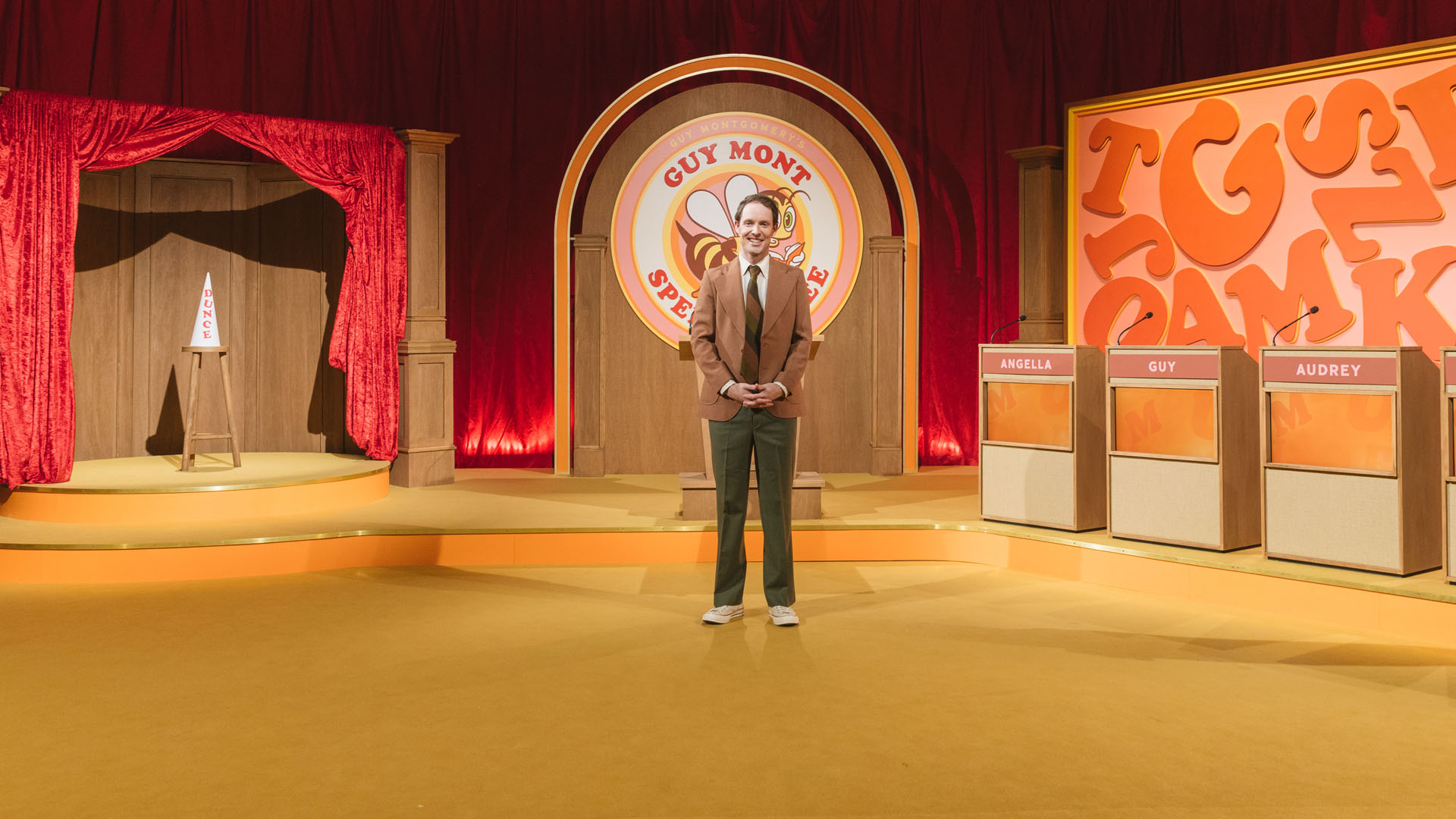
For those of us agonising over how to spell a word, it really does conjure our own past more than the present.
Absolutely. We’ve all got auto-correct and all these tools at our disposal to help us spell now. And I don’t know, do they still teach handwriting in schools? Like, do people actually physically write down or figure out how to spell words using a pen and paper? Does it even matter?
I think the answer is no, it doesn’t. It’s certainly not a marker of how smart someone is, how good they are at spelling. But we have this weird, sort of weighty, association with it, where we believe that is so.
What did you discover about your contestants within the format?
It’s quite exciting. Some people self-identify as bad spellers, and they sort of publicise that at the start of an episode, but what I found to be quite an alluring and intriguing sort of discovery was how competitive a lot of these comedians are, and especially the good spellers. How driven they are to succeed, and also, you know, the sense of justice that they have inside of this internal nonsense competition that I’ve made up!
All of a sudden, they’re blowing up at each other and at you over a perceived unfairness. In what is just so clearly, you know, nonsense—the whole thing is just pure nonsense, and it is incredible to see how seriously, how immediately seriously, it can be taken.
If I remember back to the Zoom shows, there were two spellers who were standouts and just kept winning. One was Rose Matafeo. And another was, before she did The Bear, was Ayo Edebiri, who I was friends with when I lived in New York. I had a real desire then to find these real top-tier spellers and have an all-star episode.
A lot of the spelling in the show, well, some words are very challenging, but it’s meant to be at a gettable level for most people. But I wanted to find the top tier and have, like, a real nerdy kind of high intensity, high degree of difficulty show. So that’s the dream, you know, for it to go long enough to have an all-stars spin-off or to do special iterations of it, where I do a kids episode, or whatever.
Confidence undid some people. You do get to watch some people crumble under pressure, which is quite enjoyable. Guy Williams is in an episode and he told me afterwards that he’s had a long-held theory that in the clutch moments of his life (he was a talented basketball player) that he didn’t have the mettle to pull through. And so it’s interesting to see that theory, whether that’s realised or not in the show. David Correos appears to be quite a chaotic person but there’s a sort of insular logic that he abides in. He had quite a clear strategy, I think, of how he thought he could go far in an episode.
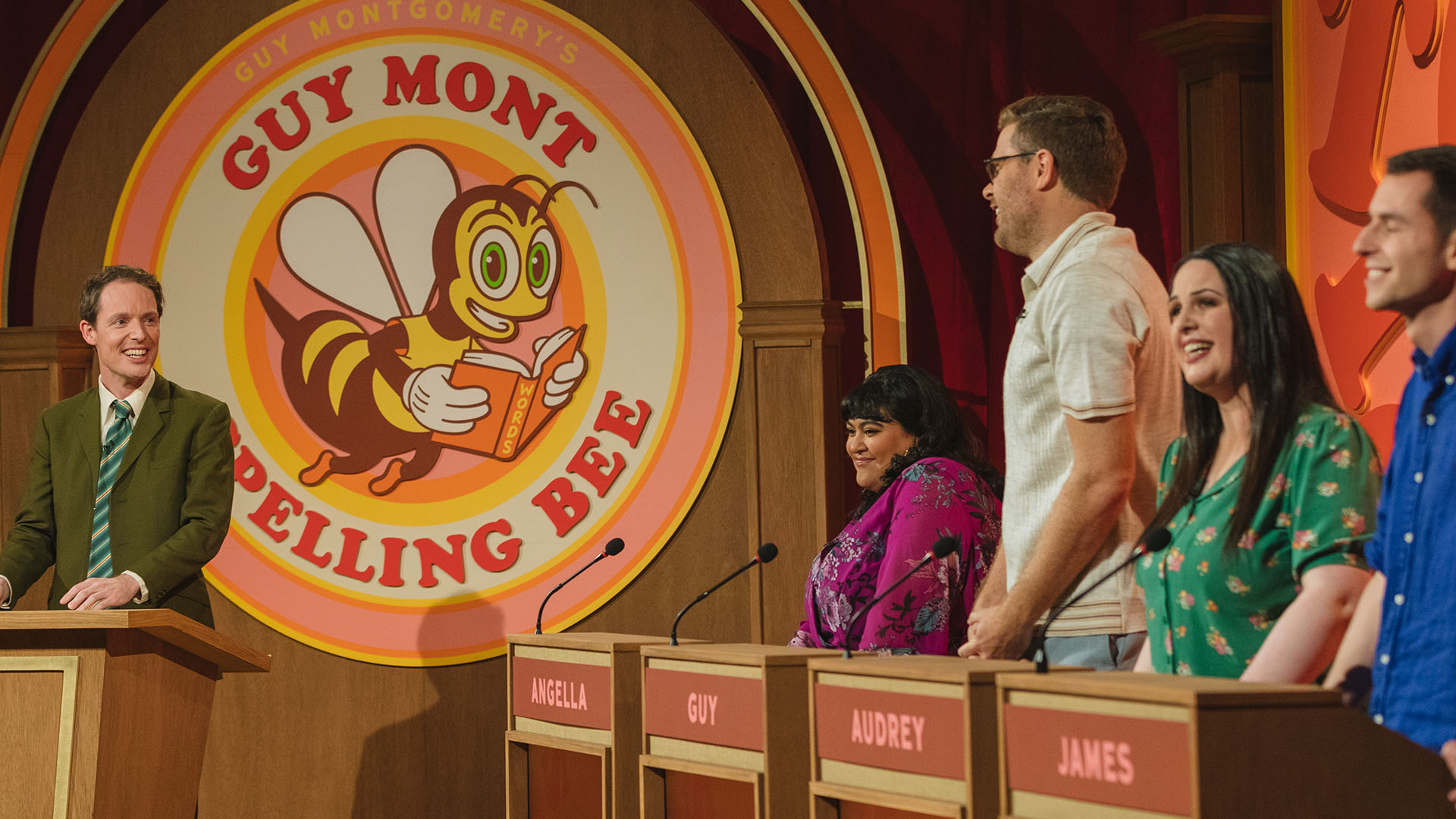
Are you suggesting that there’s more strategy required in Spelling Bee than just ‘spell words correctly’?
No, I’m not saying that. I’m saying that’s what some people brought.
But I mean, the thing is, spelling words correctly is obviously going to be a huge asset in the show. Usually, the best speller should be able to win. But there are rounds where I completely reduce, you know, the outcome of the round to luck, I guess.
How did you approach your responsibilities as host from a fashion standpoint?
Well, we had a fantastic stylist called Sacha Young, who styled myself and Sanjay for the run and then sent colour palettes to the other contestants to help try and create a sort of unified vision of how they might look, because it’s quite a colourful set. I mean, ultimately, the comedians choose what they wear. But, you know, some of them had ideas as to how they wanted to look on the show that were… probably slightly outside of their reach with what they actually had at their house.
I believe Tim Batt’s motive was that he thought it would be funny to appear on my show, dressed better than me.
I loved being able to create a platform for Tim to be on… I thought he was so funny. And in trying to create a show like this, I know from experience that appearing on a panel show like 7 Days in New Zealand can be quite intense, because it’s this really established juggernaut that a lot of us grew up watching. That felt really nice to be able to create something where I could give the opportunity to younger comedians. I just think New Zealand comedy is in such a good place, and our comedians are so funny. And so the more opportunity and variety of opportunity, you can have to showcase that, the better. I’m very grateful to be able to provide any version of that through the show.
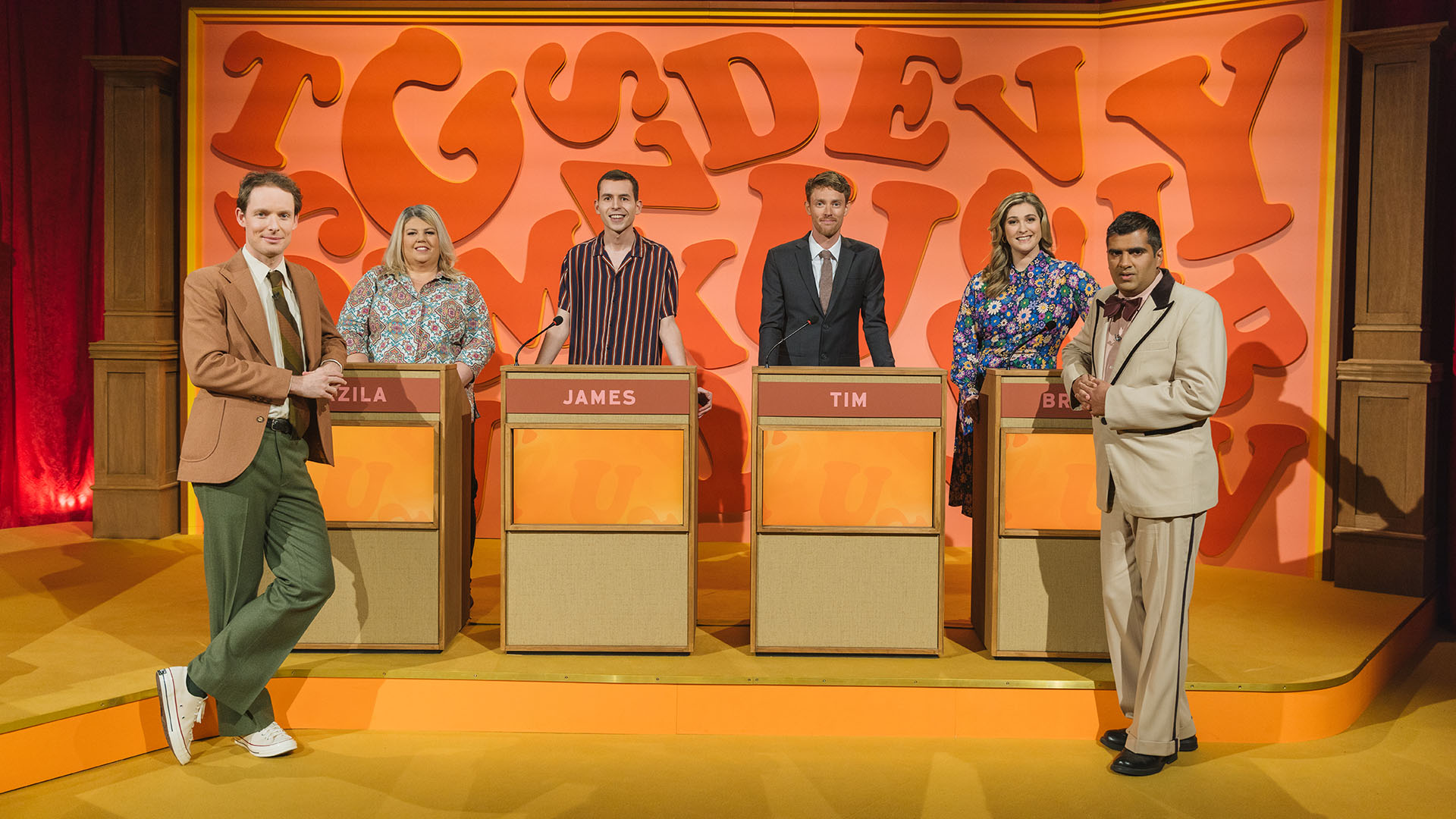
Did you find in your capacity as a host that you channelled a different kind of persona?
I sort of found it to be an extension of my stand-up persona and I guess through doing The Worst Idea of All Time with Tim, you know, there’s also an extension of that. You create something for long enough, you can’t hide behind a character or a veneer of who you are, eventually. I think that the miles that we picked up through doing the podcast all feed into comfortability in being the host.
It’s sort of an extension of my stand-up persona and the character I am on a show like Taskmaster. You know, you’re yourself—but it’s a heightened version. And I mean, what I really loved, and what I’ve always enjoyed, is that sense of false high status. I love being in charge of something that’s pointless, and I love creating a platform where, you know, my friends, comedians and my peers can all attack me. It’s so silly. And I also love being able to smack them back down. Some of the rounds are a bit fucky. And I really like that. I like being a bit fucky towards my friends.
It’s something that again, is in the spirit of Taskmaster—I like that everyone’s eligible to take potshots at me, but ultimately, I have control. And I also feel like it’s a real distillation of what I love and where my standup has come from, which is a real love of language and words.
When it comes to having the mana or the power that’s vested in a host, is that fun to wield? And is there something faintly ridiculous about that concept when it comes to a show that’s about spelling?
Yes, and yes. And I think they work in perfect synchronicity. Of course, it is fun to create a way you can have any sort of authority over equals, especially to do it through the world of the show. People can take it seriously, but beyond that it’s totally worthless and nonsense. To bring it back to the podcast, I’ve always thought that the special sauce of The Worst Idea of All Time is that implicit permission we give our audience to enjoy our misery. And so I think spiritually that exists in Spelling Bee as well.
Like, as long as the show is on, spelling is the most important thing in the world. And I have the total authority or final say over what happens inside of it. But ultimately, everyone watching knows that this is nonsense, and none of it matters—but it’s the ability to elevate that nonsense so that for the hour it’s on, it feels deserving of your attention, that it does matter.
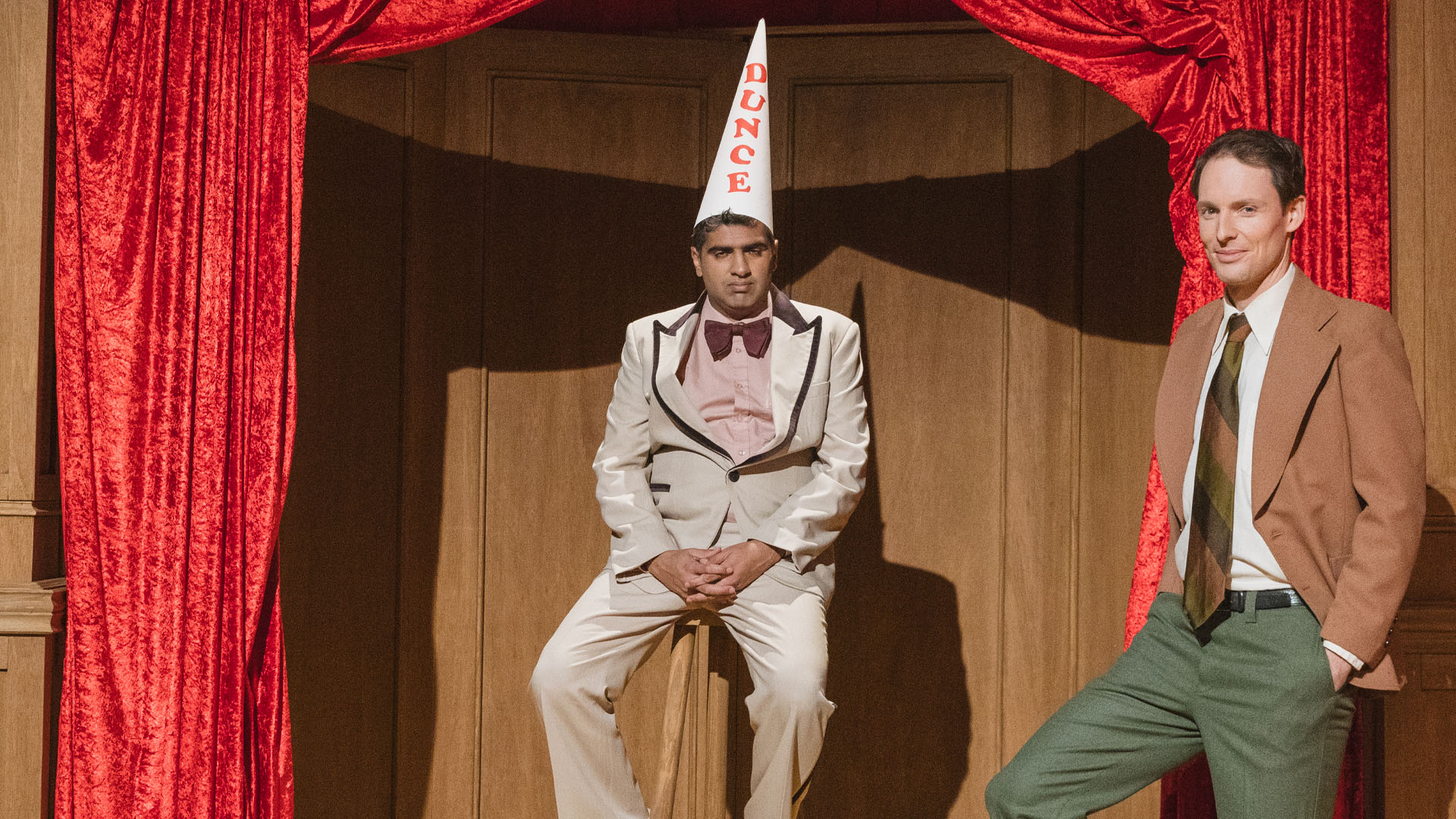
Funnily enough, you’ve touched on the concept of spelling a few times during this conversation. But I think I probably should inquire further – are there specific words you have a problem with? Or find particularly interesting?
A classic one, I actually can’t remember if it’s in the show, is ‘onomatopoeia’, it’s just such a powerful assembly of vowels. I love at the end, it’s sort of just this grab bag of letters, you know. Unless you study how to spell it, you can basically just pull vowels out of a hat, and hope that you’ve got it correct.
I feel if I was standing in a row of people who are trying to spell ‘onomatopoeia’, it would become a great showcase for the rising intonation of the New Zealand accent.
It captures perfectly the intersection of the challenges of spelling and the unique cadence afforded to New Zealanders. I remember as a child being obsessed with words like—I don’t even know how to pronounce it—Lieutenant or “leftenant”. Words where there is a sound that is not represented in what is written down. So it’s not even silent letters. Because it’s almost like phantom letters, like, how can you have an F sound in it?
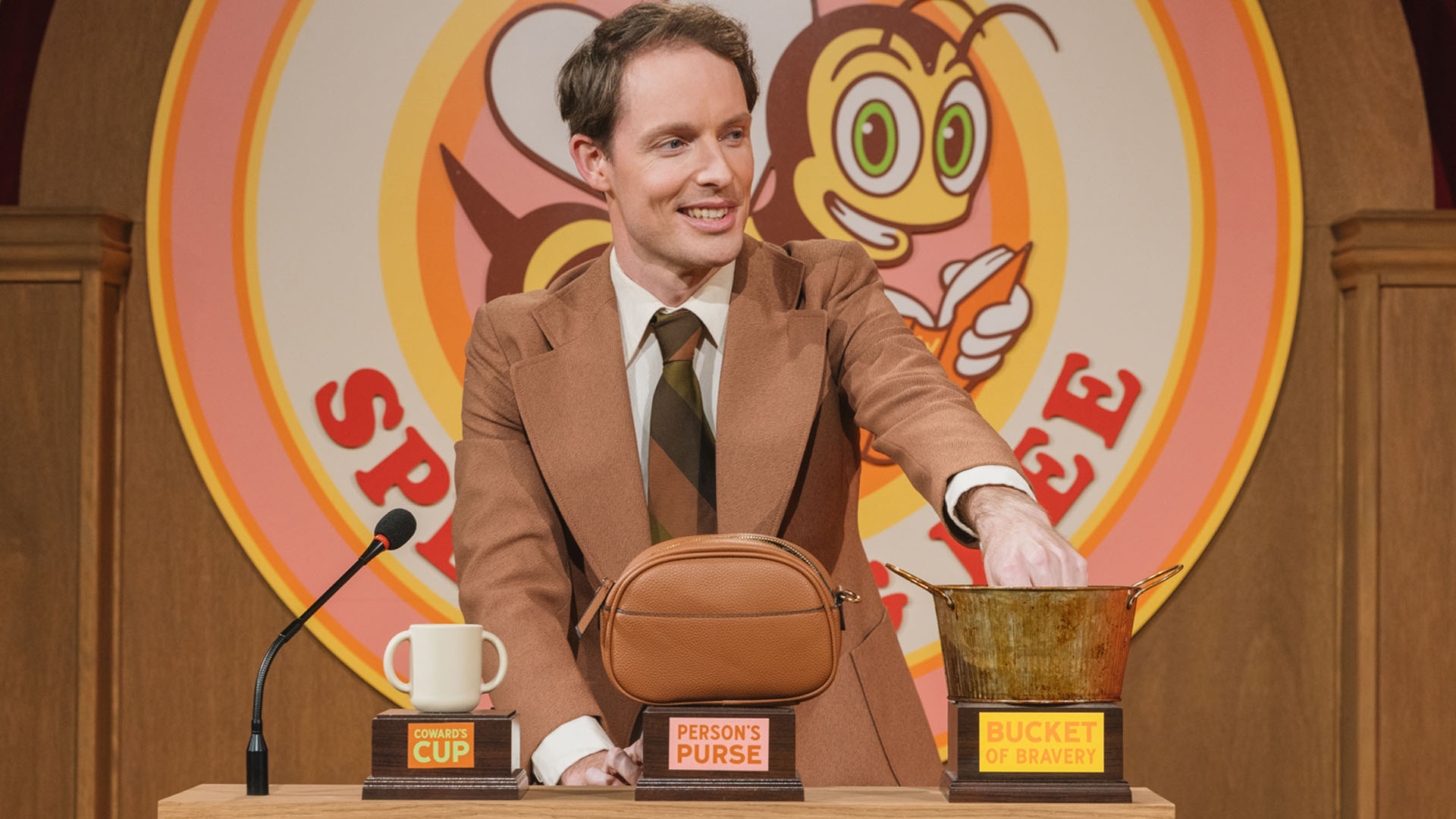
Was there a feeling of elation when you found a word that you knew was going to be good for the show?
Yeah, definitely. Like, I already think about a language a lot for writing stand-up. Some premises or jokes in stand-up, whether they’re funny or not can hinge on a word choice. And so it’s something that I would always turn over and think about. But what I enjoyed was suddenly, like, I’d be reading and there’d be a word. You know, I’d suddenly be noticing the way words are spelled in the middle of a sentence, I’d think “that would be a good word to get someone to spell”.
And so there’s all of a sudden they had this value, this professional creative value, and became this sort of obsession. I had this list of words on my phone, this notes app full of words I’d found that would work well, and then was categorising them into difficulties. The first round, it’s called The Spelling Round. and contestants choose the difficulty of the word they’ll spell—from the Coward’s Cup, Person’s Purse, or Bucket of Bravery. And so that was really fun.
An interesting byproduct I noticed was when, towards the end of the year, I was doing these improvised stand-up shows to help start generating new material, and was doing those shows really close to when I was making Spelling Bee. The stand-up I was improvising, which was coming from a subconscious part of my brain that was trying to grasp onto something funny, was around letters.
Like, I already did a lot of letter-based comedy, which is so niche, you know. I was in Melbourne, I think, doing a show and I started talking about the letter C. And it was far and away the most comfortable I felt in the hour I was doing the show, and afterwards, I was sort of lamenting. I was like, I’m just further and further into my field of comic interest. It’s nice to have found a professional and creative outlet. That means that thinking about this stuff isn’t a total waste of time.


















